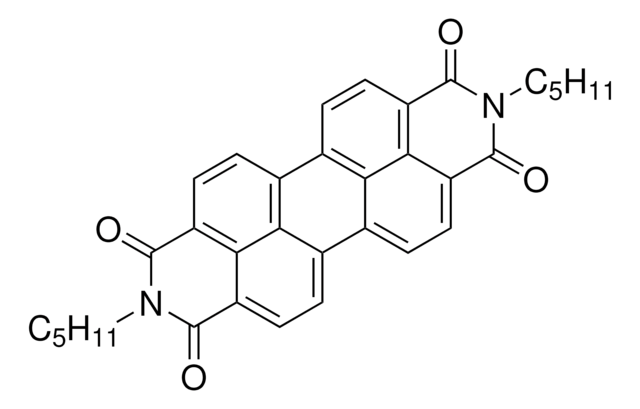773816
2,9-Dihexylanthra[2,1,9-def:6,5,10-d′e′f′]diisoquinoline-1,3,8,10(2H,9H)tetrone
98%
Synonym(s):
N,N′-Dihexyl-3,4,9,10-perylenedicarboximide, PDI-C6
About This Item
Recommended Products
Assay
98%
form
powder
mp
>360 °C (lit)
λmax
524, 448, 229 nm in dichloromethane
semiconductor properties
N-type (mobility=0.1-2.1 cm2/V·s)
SMILES string
CCCCCCN1C(=O)c2ccc3c4ccc5C(=O)N(CCCCCC)C(=O)c6ccc(c7ccc(C1=O)c2c37)c4c56
InChI
1S/C36H34N2O4/c1-3-5-7-9-19-37-33(39)25-15-11-21-23-13-17-27-32-28(36(42)38(35(27)41)20-10-8-6-4-2)18-14-24(30(23)32)22-12-16-26(34(37)40)31(25)29(21)22/h11-18H,3-10,19-20H2,1-2H3
InChI key
DAMUEXRCHXVMQS-UHFFFAOYSA-N
Application
- High electron transporting character
- Perylenebis(dicarboximide)s (PDIs) can be used as n-type materials for organic fieldeffect transistors (OFETs)
- Good optical properties
- Suitable for use in solution-processed organic phototransistors (OPTs)
- Excellent candidate as an electron accepting building block for organic photovoltaics (OPVs)
Signal Word
Warning
Hazard Statements
Precautionary Statements
Hazard Classifications
Eye Irrit. 2 - Skin Irrit. 2 - STOT SE 3
Target Organs
Respiratory system
Storage Class Code
11 - Combustible Solids
WGK
WGK 3
Flash Point(F)
Not applicable
Flash Point(C)
Not applicable
Certificates of Analysis (COA)
Search for Certificates of Analysis (COA) by entering the products Lot/Batch Number. Lot and Batch Numbers can be found on a product’s label following the words ‘Lot’ or ‘Batch’.
Already Own This Product?
Find documentation for the products that you have recently purchased in the Document Library.
Articles
Intrinsically stretchable active layers for organic field-effect transistors (OFET) are discussed. Polymer structural modification & post-polymerization modifications are 2 methods to achieve this.
Fabrication procedure of organic field effect transistor device using a soluble pentacene precursor.
Solution-processed organic photovoltaic devices (OPVs) have emerged as a promising clean energy generating technology due to their ease of fabrication, potential to enable low-cost manufacturing via printing or coating techniques, and ability to be incorporated onto light weight, flexible substrates.
Solution-processed organic photovoltaic devices (OPVs) have emerged as a promising clean energy generating technology due to their ease of fabrication, potential to enable low-cost manufacturing via printing or coating techniques, and ability to be incorporated onto light weight, flexible substrates.
Our team of scientists has experience in all areas of research including Life Science, Material Science, Chemical Synthesis, Chromatography, Analytical and many others.
Contact Technical Service








